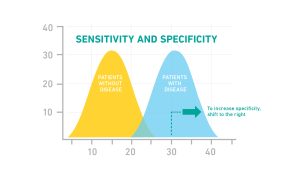
"The more tests I do the better I will understand my body," is a common refrain in this 'quantified-self' era. There is a growing amount of research that suggests this is just not true. Testing otherwise healthy people leads to a statistically significant number of false positives (for 1) and can lead to health complications, because of the invasive element of most tests (for 2). Yikes!
Cards on the table, Padma's founding story is a diagnostic workplace-based medical clinic. As such, we are incentivized and biased to see diagnostics as a very good way to understand what is going on with your body. As opposed to many other methods of catching health issues early, we place deep faith in the efficacy of the scientific method employed by the global medical community. There is a lot of science (evidence) that suggests we may not be helping otherwise healthy patients, who have no symptoms with too many narrow spectrum tests.
I came across this excellent article last week on the details of sensitivity and specificity, which are nerdy ways to talk about false positives and false negatives with testing. Medicine is Science, and Science is Statistics and without getting too much in the weeds, all bodies are different and react (occasionally) in unexpected ways.
Forgive the formatting (I find it annoyingly cutesy and distracting) if you've clicked through, but the content is important. General diagnostics (broad blood panels, chemistry panels etc.) have extremely low downside risk and broad predictive capability of where to look next as opposed to giving specific diagnoses. Many other hormone and cancer markers and immunology tests just aren't correlated with specific illness enough to apply to broader human populations.
Of course, this statistical trade-off only applies to otherwise healthy people (with no apparent ailments/symptoms) - if you have symptoms/problems with your body - you are well informed, by being a part of this member-only forum, to figure out what is wrong. And there, diagnostics are your best bet.
There is another nerdy issue related to overly referred testing which is called a 'treatment cascade' which drives a lot of a) cost and b) wasted time when either in some cases an imbalance would have regained equilibrium on its own in the body, a false positive would have been avoided or a complication would never have happened.

This 'infographic' above shows what a standard medical flow chart for how we evaluate over-testing and medical cascades. The short answer is: yuck.
So the morale of the story is, do your basic testing, but before getting deep in the weeds to test the likelihood that you have Listeria infection (a super rare form of persistent food poisoning), think about the statistics and the science and look for reinforcing evidence before self-diagnosing (or allowing another medical professional to diagnose) a rare disease.
(for the record a listeria culture has sensitivity of 98.5% and specificity of 99% in lab controlled environment. but the much more standard immunology Elisa IgM test is only 90% sensitivity and ~80% specificity - meaning 1 in 5 positive diagnoses are incorrect).


